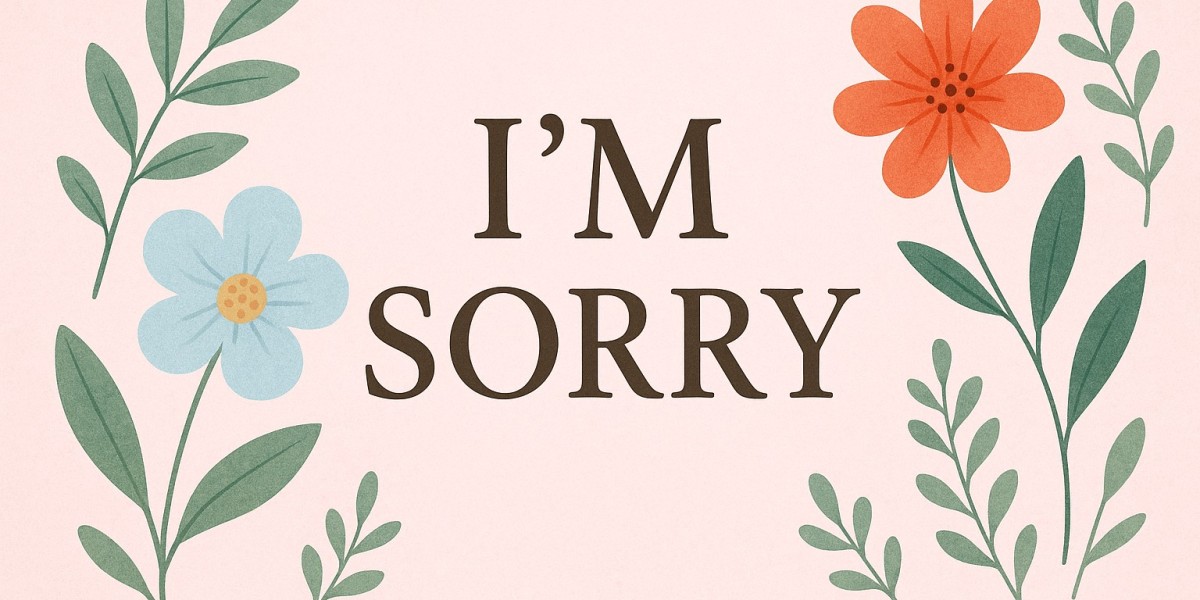Extended Article: The Healing Power of a Sincere Apology Card
Saying “I’m sorry” is one of the hardest things to do—yet one of the most powerful. Apologies carry emotional weight, and when delivered thoughtfully, they can rebuild trust, mend relationships, and help two people move forward. In our fast-paced digital world, apologies are often rushed, unclear, or reduced to a quick text message that lacks depth. This is exactly where a heartfelt apology card rises above everything else.
Whether someone hurt a partner, disappointed a friend, misunderstood a coworker, or unintentionally upset a family member, choosing and sending a sincere apology card demonstrates something that a rushed message simply cannot: effort, intention, and emotional maturity.
The Apology Cards section at LovingEcards offers a meaningful way to express remorse in a warm and thoughtful format. These digital cards encourage people to slow down, reflect, and share a message that genuinely acknowledges feelings. And in today’s world, where most communication is transactional, choosing to send an apology card shows humility, care, and emotional intelligence.
Below is an extended deep-dive into why apology cards matter, why they work, and how they strengthen relationships of all kinds.
Why Apology Cards Matter More Than Ever
Most apologies today are reduced to:
A quick “sorry”
A short text message
A reluctant acknowledgment
Or worse—silence
But meaningful apologies cannot be rushed. They require emotional presence, self-awareness, accountability, and compassion. Apology cards encourage the sender to slow down and truly think about what they want to say, making the apology more genuine and impactful.
1. An apology card shows effort—and effort matters
When you take the time to choose and send an apology card, it shows that you genuinely care about repairing the relationship. Unlike a text, which can feel effortless or insincere, an apology card communicates:
“I put thought into this.”
“I value you.”
“This relationship matters.”
“I want to make things right.”
Effort is often the missing piece in failed apologies. A thoughtful apology card fills that gap.
2. Apology cards create emotional space for reflection
A card offers a moment of pause—a chance to reflect on what happened and how the other person feels. For the sender, it becomes a way to thoughtfully express remorse. For the receiver, it becomes a safe space to feel acknowledged, validated, and seen.
3. Written words have lasting emotional impact
People reread meaningful messages. A heartfelt apology card becomes a keepsake—digital or physical—that the recipient can come back to.
When emotions run high, people often struggle to process spoken apologies. But written apologies:
Are clearer
Are more thoughtful
Have no interruptions
Allow the recipient to respond in their own time
This clarity and emotional grounding make apology cards incredibly effective at healing tension.
The Psychology Behind a Great Apology Card
A strong apology has a few universal elements. The best apology cards help express:
1. Acknowledgment of what happened
People want to know that their feelings are heard. Apology cards often include gentle wording that acknowledges the situation without excuses.
2. Genuine remorse
The design, tone, and visuals in apology cards help convey sincerity. Soft colors, gentle illustrations, and calming aesthetics show humility.
3. Accountability without defensiveness
Good apology cards avoid minimizing or deflecting. Instead, they reflect understanding and responsibility.
4. Empathy and emotional awareness
An apology is more than a statement—it’s emotional connection. Many apology cards express empathy, validating the recipient’s feelings with care.
5. A commitment to do better
People don’t want apologies; they want change. A thoughtful apology card communicates that commitment in a respectful and personal way.
Why LovingEcards Makes Apologies More Meaningful
LovingEcards offers a modern, heartfelt way to express remorse through digital apology cards designed to feel warm, gentle, and personal. Their collection includes beautifully illustrated designs with calming imagery, perfect for softening emotional tension and opening the door to reconciliation.
Key Benefits of LovingEcards’ Apology Cards
Instant delivery – Perfect when apologies shouldn’t wait.
Thoughtfully designed visuals – Soft florals, pastel tones, and calming graphics help express warmth.
Customizable messages – Allows you to write a sincere apology in your own words.
Eco-friendly – A modern way to express remorse without printing.
Accessible anywhere – No need to shop, mail, or wait for delivery.
Their apology cards capture emotions through design, making even the simplest “I’m sorry” feel personal and heartfelt.
Types of Apology Cards You Can Send
LovingEcards offers a wide range of apology cards suitable for different relationships and situations. Here are some popular categories:
1. Romantic apologies
For partners, spouses, or someone you love.
These cards express vulnerability, affection, and heartfelt remorse.
2. Friendship apologies
Sometimes we hurt the people closest to us.
These cards help mend misunderstandings and restore closeness.
3. Family apologies
When tensions rise in families, a kind apology card can soften hearts and open communication.
4. Professional apologies
For coworkers, clients, or team members.
Professional apology cards maintain respect without losing warmth.
5. General apologies
For anyone in your life you're hoping to reconnect with.
Each card type offers its own tone—from lighthearted and gentle to deeply emotional and sincere.
What to Write in an Apology Card
Not sure what to say? Here’s a simple formula:
1. Start with acknowledging the situation
“I realize my actions hurt you…”
2. Express genuine remorse
“I am truly sorry for what happened…”
3. Own your mistake
“I take full responsibility…”
4. Validate their feelings
“I understand why you felt hurt…”
5. Offer a path forward
“I’d like to make things right…”
6. End with care and gratitude
“Thank you for hearing me out…”
You can tailor your message based on the relationship and the level of conflict, but this structure helps deliver a sincere, compassionate apology.
Why Apology Cards Strengthen Relationships Over Time
Relationships—romantic, friendly, or professional—are built on communication and trust. Mistakes are inevitable, but what matters most is how we handle them. Apology cards help:
Rebuild emotional connection
Open the door to honest conversation
Show emotional maturity
Reduce tension and misunderstandings
Strengthen long-term trust
A simple apology card can transform conflict into connection and hurt into healing.
The Bigger Picture: Apology Cards as Emotional Tools
In a world full of rushed conversations, short messages, and digital overload, taking the time to send an apology card is powerful. It is a form of emotional repair, a bridge between hurt feelings and reconciliation.
When you send a sincere apology card, you’re giving the recipient:
A moment of care
A symbol of respect
A gesture of humility
A meaningful reminder that relationships matter
And that is what makes apology cards one of the most thoughtful tools in maintaining human connection.
Conclusion: Let Apology Cards Speak the Words You Can't Say Out Loud
Apologies are hard. Emotions are messy. But healing is possible when done with sincerity. A well-chosen apology card helps communicate remorse in a gentle, heartfelt way that fosters trust and reconnection.
Whether you want to fix a misunderstanding, apologize for unkind words, mend a strained friendship, or simply show someone that you care, a thoughtful apology card from LovingEcards can be the beginning of something positive.



